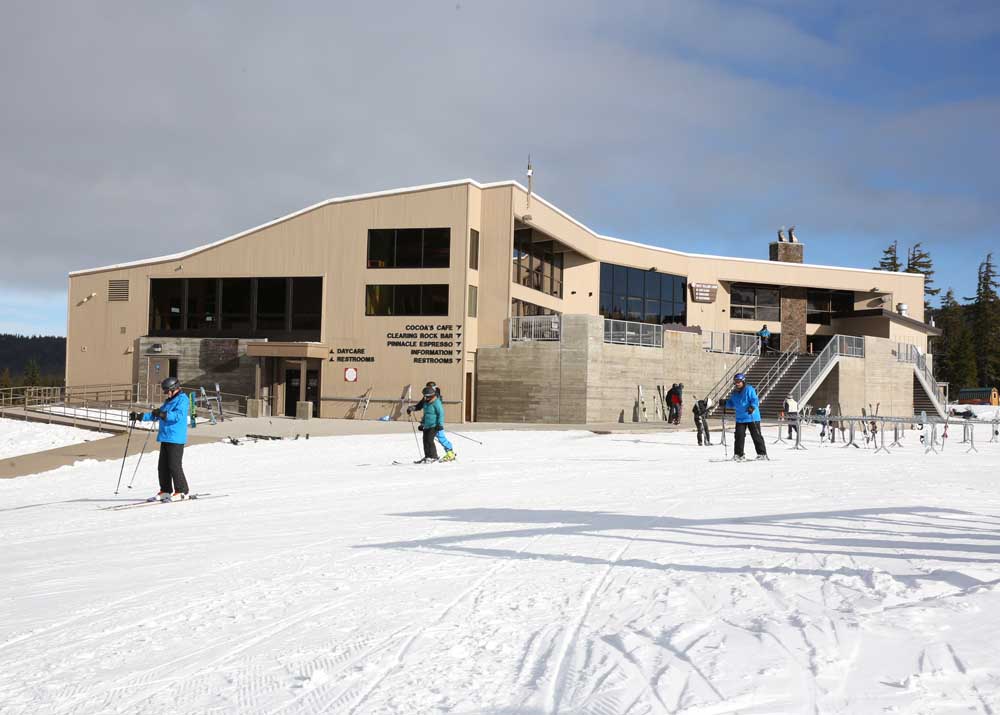County to consider funding for Mt. Bachelor biomass facility
Published 4:30 pm Tuesday, August 31, 2021

- The West Village Lodge at Mt. Bachelor ski area, seen in December 2019.
Mt. Bachelor ski area wants to build a $5.5 million biomass facility that would use locally sourced woody materials to produce heat for the resort. Deschutes County commissioners will hear a pitch for the plan at their meeting Wednesday.
The facility would replace the use of propane fuel used for heating at Mt. Bachelor, and it’s estimated that could cut the ski resort’s CO2 emissions by 18%. The project would also reduce carbon emissions created by burn piles in the Deschutes National Forest because the wood would be used as fuel for the facility. The facility would not produce electricity.
As Deschutes County grows, authorities are looking for ways to cut CO2 emissions as a way to fight climate change, especially during a time of unprecedented drought that is drying out forests and reservoirs. While the facility would still emit some carbon, the amount would be less than what the resort emits by using propane.
Phil Chang, one of the three county commissioners, said the county could help fund the facility with either a grant or a loan. Helping the project upfront will pay off in the long run in the form of annual fuel cost savings, which would help to pay down any debts, he said.
“I am really excited about this project because it will transform material produced by fuels reduction projects that we currently pile and burn in the woods into a resource to produce clean energy,” said Chang, who worked as a natural resources manager prior to being elected to the County Commission last year.
In addition to a reduction in carbon emissions, Chang said the project would also create rural jobs.
The concept of the project is not new — it was originally approved in the Mt. Bachelor Master Development Plan in 2010. Leigh Capozzi, a spokesperson for the ski resort, said there is no specific timeline for completing the project, which is being developed with consulting assistance from Portland-based Wisewood Energy.
The facility, which would burn 1,000 tons of biomass annually, is designed to generate enough heat for all West Village base area buildings. It would also eliminate the need to burn 150,000 gallons of propane a year.
The switchover from propane to biomass would also save money. The resort now spends $270,000 a year on propane, and once complete, that heating cost will be cut by two-thirds.
“The real paybacks are the environmental wins that come from further reduction of wildfire risk, reduced pollution from not having to burn existing slash piles, and elimination of the propane consumption currently used to heat the West Village base area,” said Capozzi.
The facility is on federal land, and the National Environmental Policy Act process is underway in conjunction with the U.S. Forest Service to determine environmental impacts. The environmental analysis is scheduled to start this fall or winter, said Jean Nelson-Dean, a spokesperson for the national forest.
The county’s role is primarily to assist in funding, said Chang.
“Multiple streams of finance need to line up at the same time for the project to move forward,” said Chang. “The county could be one of them, and if the county invests, it builds momentum for the other funding pieces to fall into place.”
The project also needs to be cleared by the Department of Environmental Quality. Laura Gleim, a spokesperson for the department, said initial modeling for the project showed minimal impacts to air quality and they were below the level that would require an air quality permit.
Gleim said the department will still need to review the updated project proposal to make a final determination on what permits or approvals may be required.
Chang acknowledged that some in the environmental community may be skeptical of biomass projects because they involve combustion and emissions of CO2 into the atmosphere, but he points out that the material for the fuel will be burned anyway, and thus could be put to beneficial use.
“Burning the wood fuel allows us to leave fossil fuel in the ground that would otherwise be converted to propane that Mt. Bachelor currently relies on,” said Chang. “Net carbon emissions benefit and stored fossil carbon stay stored.”






